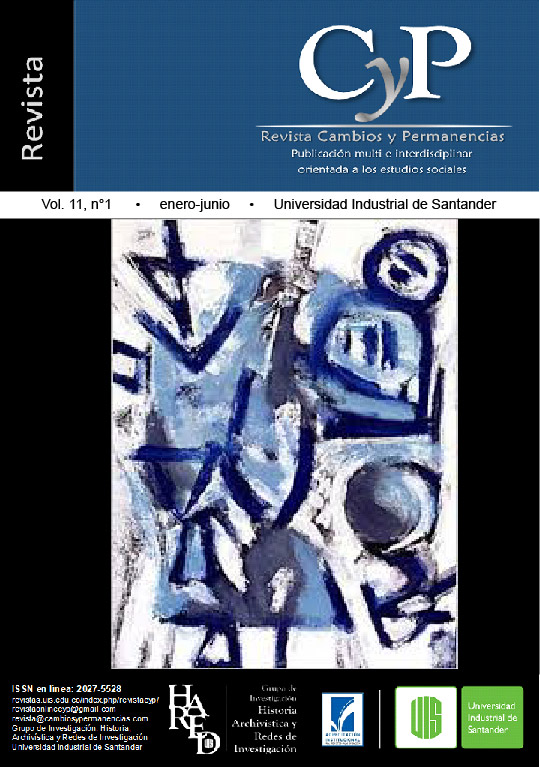The importance of sociability spaces, ONGs, entities, University for the “narrative that comes from below” of the Brazilian LGBTI movement
Published 2020-06-30
Keywords
- Oral history,
- LGBTI movement in Tocantins,
- Gay sociability
How to Cite
Abstract
The LGBT movement in Palmas, capital of Tocantins, Brazil, was strengthened with the Ipê Amarelo Group for Awareness and Struggle for Free Sexual Orientation (Giama), the first NGO that represents this public in 2002 and the opening of the Dama de Paus nightclub , the first gay entertainment event in 2003, which together contributed to the first gay pride parade of that year, bringing together about 400 people. It is supported by the Núcleo LGBT Tear da UFT, created in December 2006, and with UNE when starting the debate on sexual diversity in the student movement. Subsequently, in 2010, The Cave nightclub and the Lanterna bar were created in 2013. We bring narratives of LGBT events in Tocantins, addressing spaces of gay sociability, a sample of the investigation of the (non) impact of this movement in changing undergraduate curricula in UFT until 2010. With thematic oral history methodology based on Santos (2008) Alberti (2005), Minayo (2001) and Triviños (1987) and documentary research. It is part of the work that we have developed at PPGE/UFT in the last four years. Tensions and divergences are constitutive of social movements, as they dispute identities, strategies, conceptions of citizenship and projects of society. The history of subalternized groups needs to be written, to make historiography and, as researchers involved, we seek to debate the (in)visibility, of the "history from below" and, thus, (re)build "forgotten memories" and subsumed in prejudice, in hatred, in the gender denial that aggravate LGBT phobia and its related forms of violence against LGBT people.
Downloads
References
Borrillo, D. (2010). Homofobia: história e crítica de um preconceito. Belo Horizonte, Brasil: Autêntica.
Fontes, M. (2007). Os percursos do corpo na cultura contemporânea. In: C. Edvaldo Souza., Goellner., y S. Vilodre. Corpos mutantes. Porto Alegre, Brasil: Editora da UFRGS.
González, M. A. (2019). Tiempos intoxicados en sociedades agendadas: sospechar un poco del tiempo educativo. Bogotá, Colombia: Ediciones desde abajo, Coedición Universidad de Manizales.
Irineu, B. A. (2018). Negociações, disputas e tensões na arena LGBT brasileira entre os anos de 2020 e 2014. In: J. N. Green., R. Quinalha., y M. Fernandes. (Orgs.). História do movimento LGBT no Brasil. Brasil: Alameda.
Irineu, B. A., y Rodrigues, M. M. (2015). Militância LGBT, memória e extensão universitária: reconstruindo histórias de resistência a partir da produção de um documentário. Revista Feminismos, 3(1). Recuperado de www.feminismos.neim.ufba.br
Rocha, J. D. T., Galvão, M. de O. (2011). Aspectos da diversidade sexual no curso de Direito da UFT. Seminário de Educação, Gênero e Infância. Tocantinópolis, Brasil: UFT.
Rocha, J. Damião T. (2012). Juventude LGBT e bullying homofóbico nas instituições educacionais: relatos e debates de experiências no Tocantins. In: B. Irineu., Froemming., C. Nunes (Orgs.). Gênero, sexualidade e direitos: construindo políticas de enfrentamento ao sexismo e à homofobia. Palmas, Brasil: Eduft.
Rocha, J., Damião T. (2012). As picadas abertas no cerrado: ausência e emergência da diversidade sexual e de gênero nos currículos no Tocantins. In: Abeh – VI Congresso Internacional de Estudos sobre a Diversidade Sexual e de Gênero. UFBA, Salvador, BA, ago.
Rocha, J., Damião. T. et al. (2010). Conceitos e concepções sobre diversidade sexual nas conferências nacionais LGBTT e Conae. VII Simpósio de Educação do Campus de Palmas Educar na(s) Diversidade(s). Palmas, Brasil: UFT.
Rocha, J., Damião. T., y Damiana, F. (2011). Tópicos da diversidade sexual nos currículos de Pedagogia da UFT. Seminário de Educação, Gênero e Infância. Tocantinópolis, Brasil: UFT.
Santos, B. S. (2018). ¿Reinventar las izquierdas? (S. L.). Recuperado de file:///E:/latinoamerica____buena%20escuela%20bueno%20professor/Reinventar%20las%20izquierdas%20Boaventura%20sousa%20santos.pdf
Soares, R. (2000). Adolescência: monstruosidade cultural? Educação & Realidade, Porto Alegre, 2(25), 151-159.
Soares, S. R., Souza, A. de. (2011). O lugar representado: o Tocantins no cinema de si mesmo. VIII Encontro Nacional de História da Mídia. Guarapuava, Brasil: PR, Unicentro, abr.
Zibechi, R. (2017). Movimientos sociales en América Latina: El “mundo otro” en movimento. Bogotá, Colombia: Ediciones desde abajo, Coedición Universidad de Manizales.

